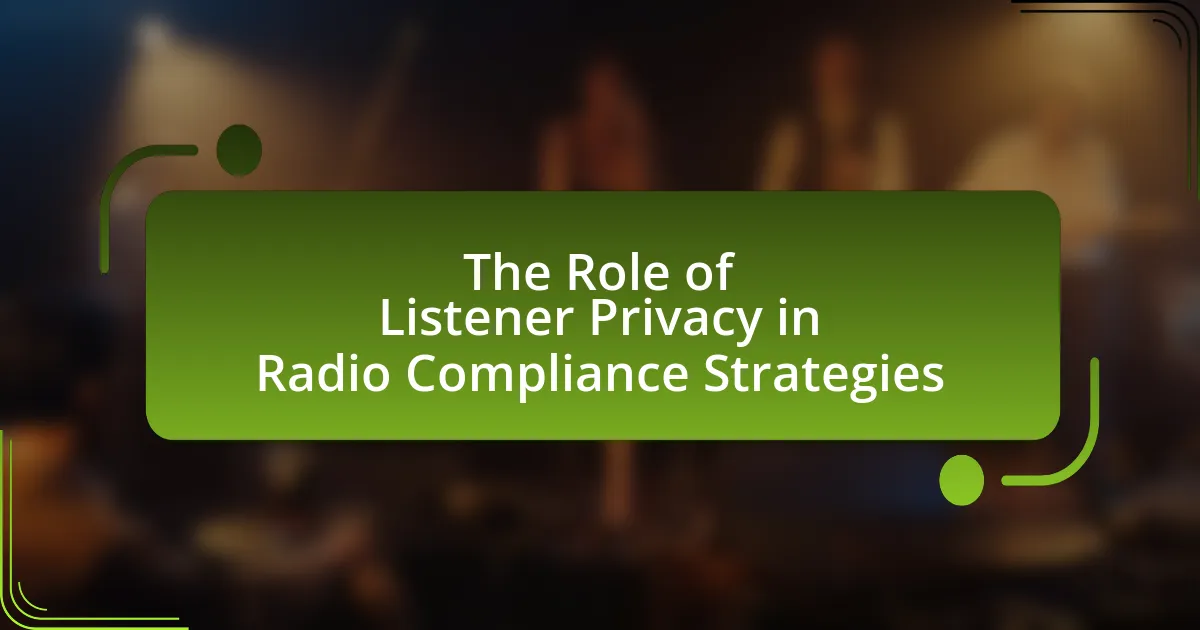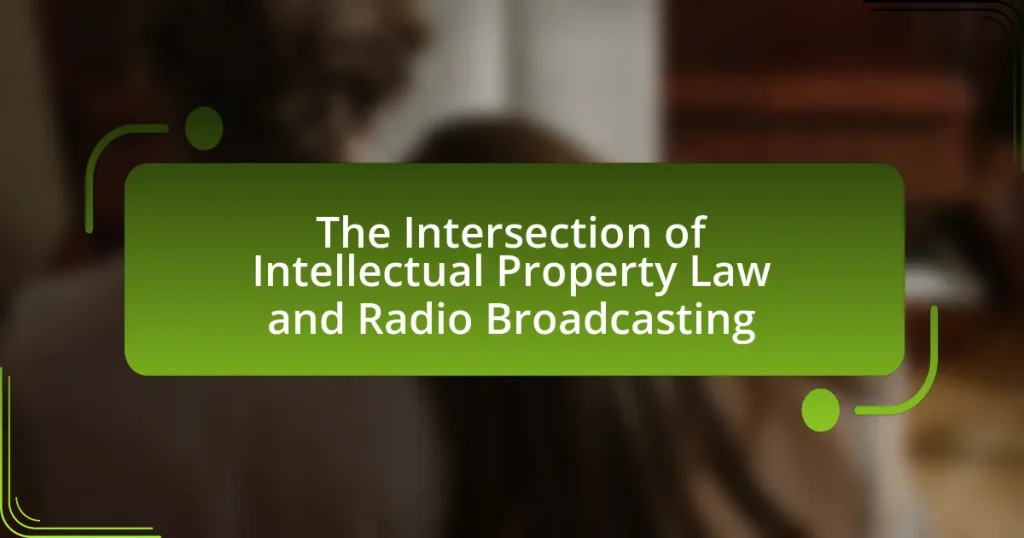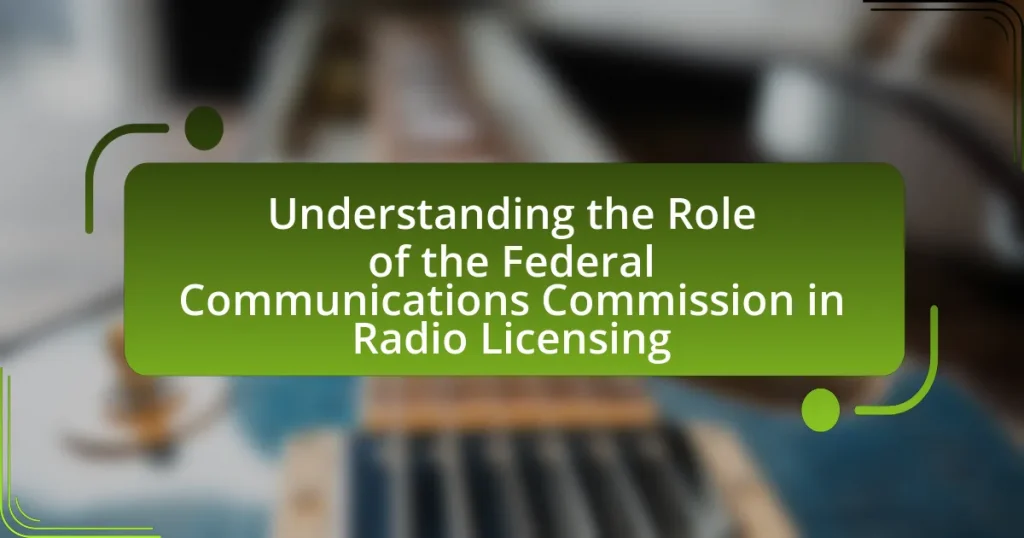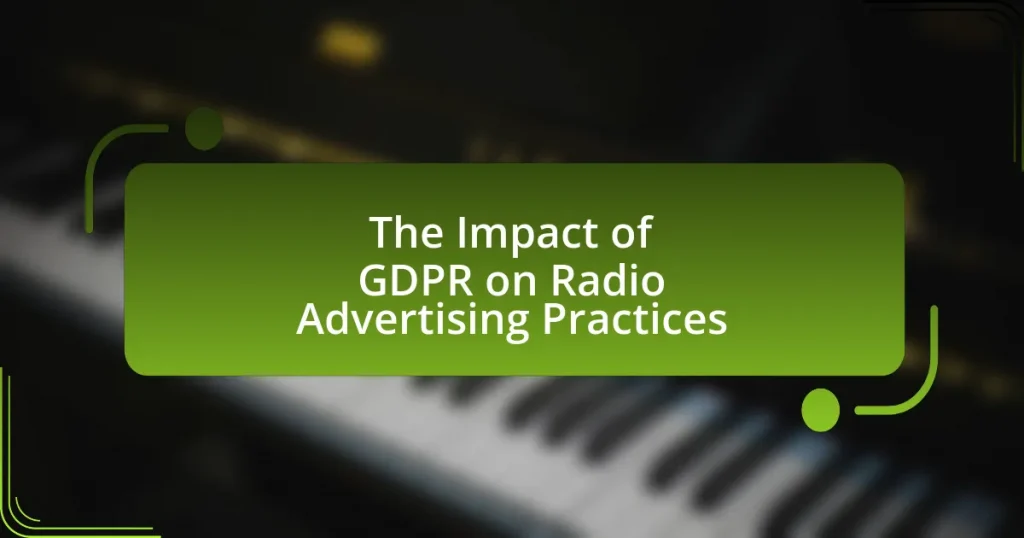Listener privacy is a critical component of radio compliance strategies, ensuring that broadcasters adhere to legal and ethical standards regarding the collection and use of listener data. The article outlines the importance of listener privacy in fostering trust and engagement, the legal frameworks governing data protection, and the challenges radio stations face in balancing privacy with advertising needs. It also discusses the impact of technological advancements on listener privacy, common misconceptions, and best practices for compliance. Furthermore, the article highlights the role of training, transparency, and innovative solutions in enhancing listener privacy and maintaining compliance with evolving regulations.
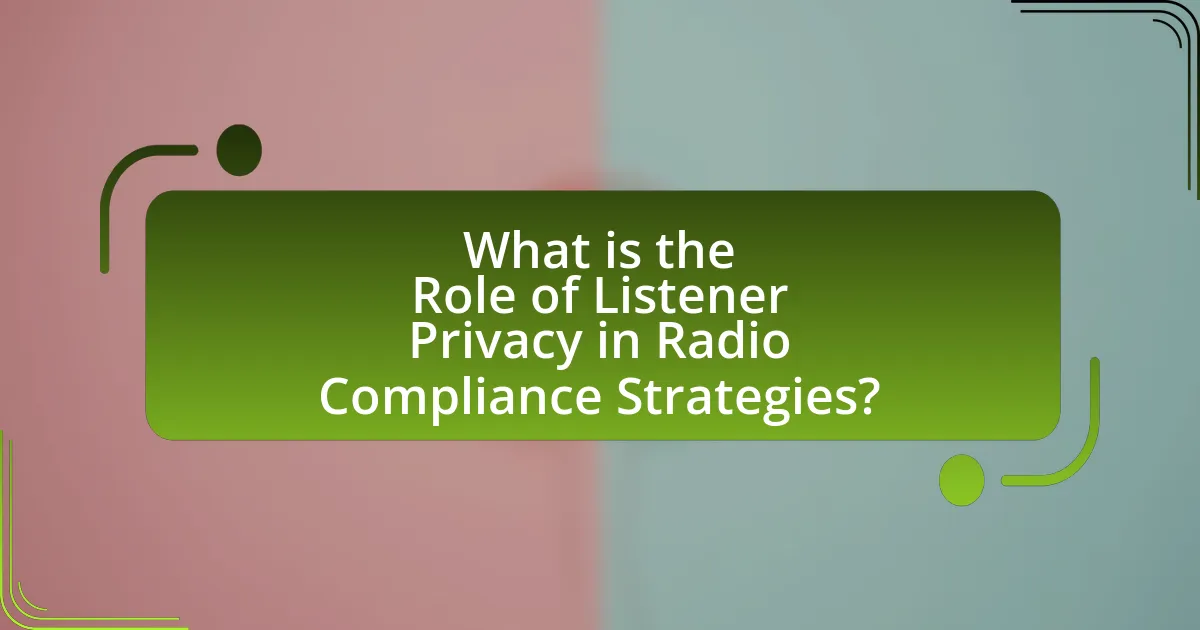
What is the Role of Listener Privacy in Radio Compliance Strategies?
Listener privacy plays a crucial role in radio compliance strategies by ensuring that broadcasters adhere to legal and ethical standards regarding the collection and use of listener data. Compliance with regulations such as the General Data Protection Regulation (GDPR) mandates that radio stations obtain consent from listeners before collecting personal information, thereby protecting individual privacy rights. This adherence not only mitigates the risk of legal penalties but also fosters trust between listeners and broadcasters, which is essential for maintaining audience loyalty. Furthermore, studies indicate that stations that prioritize listener privacy are more likely to enhance their brand reputation and listener engagement, demonstrating the tangible benefits of integrating privacy considerations into compliance strategies.
Why is listener privacy important in radio broadcasting?
Listener privacy is important in radio broadcasting because it fosters trust between the audience and broadcasters, ensuring that listeners feel secure in their engagement with the medium. When listeners know their personal information and listening habits are protected, they are more likely to participate in surveys, contests, and feedback opportunities, which enhances audience interaction and loyalty. According to a 2021 survey by the Pew Research Center, 79% of Americans expressed concern about how their data is collected and used, highlighting the necessity for broadcasters to prioritize listener privacy to maintain a positive relationship with their audience.
What are the legal frameworks governing listener privacy?
The legal frameworks governing listener privacy primarily include the Federal Communications Commission (FCC) regulations, the Telephone Consumer Protection Act (TCPA), and the General Data Protection Regulation (GDPR) in the European Union. The FCC enforces rules that protect listener information from unauthorized use and disclosure, while the TCPA restricts telemarketing calls and requires consent for automated calls, thereby safeguarding listener privacy. Additionally, the GDPR mandates strict guidelines for data protection and privacy, impacting how listener data is collected and processed by radio stations operating in or targeting audiences in the EU. These frameworks collectively ensure that listener privacy is respected and maintained across various broadcasting platforms.
How does listener privacy impact audience trust?
Listener privacy significantly impacts audience trust by influencing how secure listeners feel about sharing their personal information. When listeners believe their privacy is protected, they are more likely to engage with content and provide feedback, fostering a sense of loyalty and connection to the platform. Conversely, breaches of privacy or inadequate protection measures can lead to distrust, resulting in decreased audience engagement and potential loss of listeners. Research indicates that 79% of consumers are concerned about how their data is used, highlighting the importance of privacy in maintaining trust. Thus, effective listener privacy strategies are essential for building and sustaining audience trust in radio compliance.
What challenges do radio stations face regarding listener privacy?
Radio stations face significant challenges regarding listener privacy, primarily due to the need to balance data collection for targeted advertising with compliance to privacy regulations. The increasing scrutiny from laws such as the General Data Protection Regulation (GDPR) in Europe and the California Consumer Privacy Act (CCPA) in the United States imposes strict requirements on how listener data is collected, stored, and used. For instance, radio stations must ensure they obtain explicit consent from listeners before collecting personal information, which can complicate marketing strategies and limit data-driven decision-making. Additionally, the risk of data breaches poses a threat to listener privacy, as unauthorized access to sensitive information can lead to legal repercussions and damage to the station’s reputation.
How do technological advancements affect listener privacy?
Technological advancements significantly impact listener privacy by enabling the collection and analysis of personal data through various digital platforms. For instance, radio stations and streaming services can track listener behavior, preferences, and location through mobile apps and online interactions, often without explicit consent. According to a 2021 report by the Electronic Frontier Foundation, over 80% of mobile apps used by radio stations collect user data, raising concerns about unauthorized data sharing and surveillance. This data can be exploited for targeted advertising, leading to potential breaches of privacy and trust among listeners.
What are the common misconceptions about listener privacy in radio?
Common misconceptions about listener privacy in radio include the belief that listener data is always anonymous and that radio stations do not track listener behavior. In reality, many radio stations collect data on listener preferences and demographics, often through surveys and digital platforms, which can be linked to individual identities. Additionally, some listeners assume that their interactions, such as phone calls or social media engagement, are private, but these communications can be recorded and used for promotional purposes. According to a 2021 study by the Pew Research Center, 79% of Americans expressed concern about how their data is collected and used, highlighting the need for transparency in listener privacy practices.

How do radio compliance strategies incorporate listener privacy?
Radio compliance strategies incorporate listener privacy by implementing data protection measures and adhering to regulations that safeguard personal information. These strategies often include anonymizing listener data, obtaining consent for data collection, and ensuring transparency about how listener information is used. For instance, the Federal Communications Commission (FCC) mandates that radio stations disclose their data practices, which reinforces the importance of listener privacy in compliance frameworks. Additionally, compliance with laws such as the General Data Protection Regulation (GDPR) in Europe further emphasizes the necessity of protecting listener data, ensuring that radio stations prioritize privacy in their operational practices.
What are the key components of effective compliance strategies?
The key components of effective compliance strategies include clear policies, regular training, monitoring and auditing, and a culture of compliance. Clear policies provide a framework for expected behaviors and legal requirements, ensuring that all employees understand their responsibilities. Regular training reinforces these policies and keeps staff updated on changes in regulations. Monitoring and auditing processes help identify compliance gaps and ensure adherence to established standards. Finally, fostering a culture of compliance encourages employees to prioritize ethical behavior and report violations, which is essential for maintaining integrity within the organization.
How do radio stations ensure adherence to privacy regulations?
Radio stations ensure adherence to privacy regulations by implementing strict data management policies and training staff on compliance requirements. These policies include obtaining explicit consent from listeners before collecting personal information, ensuring secure storage of data, and regularly reviewing practices to align with regulations such as the General Data Protection Regulation (GDPR) and the California Consumer Privacy Act (CCPA). Additionally, radio stations often conduct audits and assessments to identify potential privacy risks and address them proactively, thereby maintaining compliance and protecting listener privacy.
What role does training play in compliance strategies?
Training is essential in compliance strategies as it equips employees with the knowledge and skills necessary to adhere to regulations and policies. Effective training programs ensure that staff understand the legal requirements and ethical standards relevant to their roles, thereby reducing the risk of non-compliance. For instance, organizations that implement regular compliance training report a 50% decrease in violations, demonstrating the direct impact of training on compliance outcomes.
How can radio stations balance listener privacy with advertising needs?
Radio stations can balance listener privacy with advertising needs by implementing transparent data collection practices and utilizing anonymized data for targeted advertising. By clearly communicating their data usage policies, stations can build trust with listeners while still gathering valuable insights for advertisers. For instance, a study by the Pew Research Center found that 79% of consumers are concerned about how their data is being used, indicating that transparency can enhance listener loyalty. Additionally, using aggregated and anonymized data allows radio stations to deliver relevant ads without compromising individual privacy, aligning with regulations such as the GDPR, which emphasizes data protection.
What are the ethical considerations in using listener data for advertising?
The ethical considerations in using listener data for advertising include privacy, consent, and data security. Privacy concerns arise when listener data is collected without explicit permission, potentially violating individual rights. Consent is crucial, as advertisers must ensure that listeners are aware of and agree to how their data will be used. Data security is also a significant consideration, as mishandling or breaches of listener data can lead to unauthorized access and misuse, impacting trust and reputation. According to a 2021 study by the Pew Research Center, 79% of Americans expressed concern about how their data is being used by advertisers, highlighting the importance of ethical practices in data handling.
How can transparency enhance listener privacy in advertising practices?
Transparency can enhance listener privacy in advertising practices by ensuring that consumers are informed about how their data is collected, used, and shared. When advertisers disclose their data practices, listeners can make informed choices about their engagement with advertisements, leading to greater trust and a sense of control over their personal information. Research indicates that 81% of consumers feel they have little control over their data, highlighting the need for transparency to empower listeners. By implementing clear privacy policies and obtaining explicit consent, advertisers can foster a more respectful relationship with their audience, ultimately enhancing listener privacy and compliance with regulations such as the GDPR.
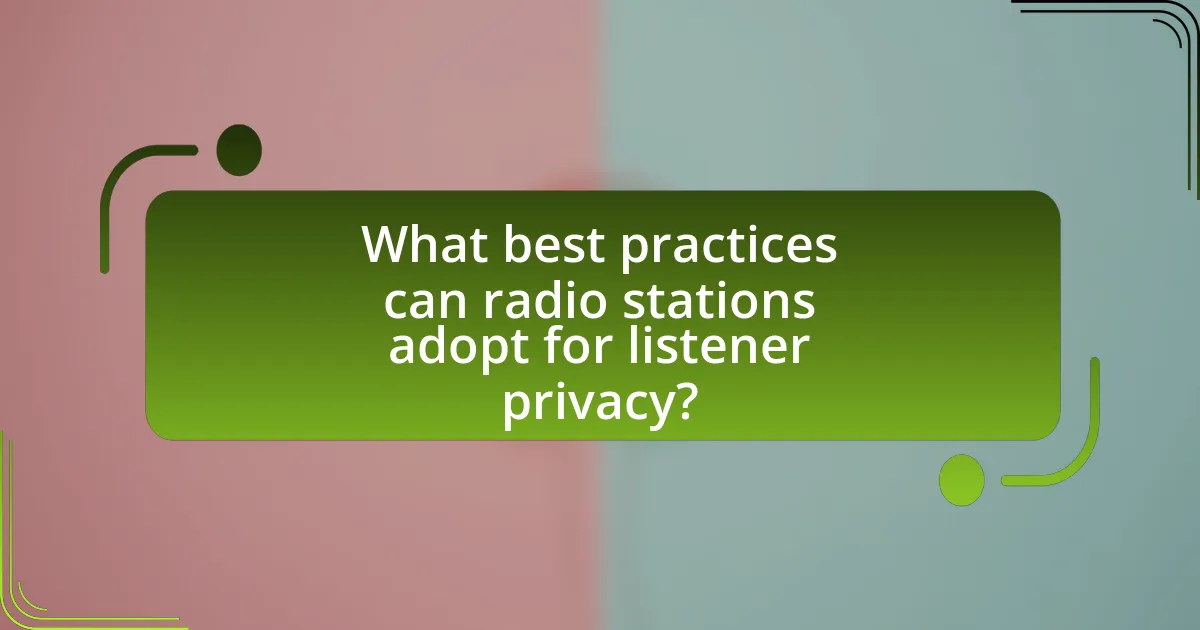
What best practices can radio stations adopt for listener privacy?
Radio stations can adopt several best practices for listener privacy, including implementing robust data protection policies, ensuring transparency in data collection, and obtaining explicit consent from listeners. By establishing clear data protection policies, radio stations can safeguard personal information against unauthorized access and breaches. Transparency in data collection practices allows listeners to understand what data is being collected and how it will be used, fostering trust. Additionally, obtaining explicit consent ensures that listeners are aware of and agree to the data practices, aligning with regulations such as the General Data Protection Regulation (GDPR), which mandates consent for data processing. These practices not only enhance listener privacy but also help radio stations comply with legal requirements.
How can radio stations implement privacy policies effectively?
Radio stations can implement privacy policies effectively by establishing clear guidelines that comply with legal standards and ensuring transparency with listeners about data collection practices. This involves creating comprehensive privacy policies that outline what data is collected, how it is used, and the measures taken to protect that data. According to the Federal Communications Commission (FCC), radio stations must adhere to regulations that protect listener information, which includes obtaining consent before collecting personal data. Additionally, regular training for staff on privacy practices and conducting audits to assess compliance can further enhance the effectiveness of these policies.
What steps should be taken to communicate privacy policies to listeners?
To communicate privacy policies to listeners, radio stations should take the following steps: clearly outline the privacy policy in accessible language, ensure it is prominently displayed on the station’s website and during broadcasts, and provide listeners with opportunities to ask questions or seek clarification.
Research indicates that transparency in privacy practices fosters trust; for instance, a study by the Pew Research Center found that 79% of Americans are concerned about how their data is being used. Therefore, actively engaging listeners through regular updates and feedback mechanisms can enhance their understanding and compliance with privacy policies.
How can feedback from listeners improve privacy practices?
Feedback from listeners can significantly improve privacy practices by providing insights into their concerns and expectations regarding data handling. When listeners express their views on privacy issues, radio stations can identify specific areas where their practices may fall short, allowing them to make informed adjustments. For instance, a survey conducted by the Pew Research Center found that 79% of Americans are concerned about how their data is used by companies, indicating a strong demand for transparency and better privacy measures. By actively incorporating listener feedback, radio stations can enhance their compliance strategies, ensuring they align with audience expectations and legal requirements.
What tools and technologies can assist in maintaining listener privacy?
Tools and technologies that assist in maintaining listener privacy include encryption software, anonymizing networks, and privacy-focused applications. Encryption software, such as AES (Advanced Encryption Standard), secures data transmission, ensuring that listener information remains confidential. Anonymizing networks like Tor obscure users’ IP addresses, making it difficult to trace their online activities. Privacy-focused applications, such as Signal for messaging, utilize end-to-end encryption to protect user communications. These technologies collectively enhance listener privacy by safeguarding personal data from unauthorized access and tracking.
How do data encryption and anonymization techniques work?
Data encryption and anonymization techniques work by transforming sensitive information into formats that protect user privacy and prevent unauthorized access. Data encryption uses algorithms to convert plaintext into ciphertext, making it unreadable without a decryption key; for example, the Advanced Encryption Standard (AES) is widely used for securing data in transit and at rest. Anonymization, on the other hand, involves removing or altering personally identifiable information (PII) from datasets, ensuring that individuals cannot be re-identified; techniques such as data masking and k-anonymity are commonly employed to achieve this. These methods are essential for compliance with privacy regulations like GDPR, which mandates the protection of personal data.
What role do privacy management software solutions play?
Privacy management software solutions play a crucial role in ensuring compliance with data protection regulations and safeguarding listener information in the radio industry. These solutions facilitate the identification, monitoring, and management of personal data, enabling radio stations to adhere to laws such as the General Data Protection Regulation (GDPR) and the California Consumer Privacy Act (CCPA). By automating data inventory processes and providing tools for consent management, privacy management software helps organizations mitigate risks associated with data breaches and enhances transparency in data handling practices. This is essential for maintaining listener trust and avoiding significant fines, as non-compliance can result in penalties reaching up to 4% of annual global turnover under GDPR.
What are the future trends in listener privacy for radio compliance?
Future trends in listener privacy for radio compliance include increased regulation, enhanced data protection technologies, and greater transparency in data usage. Regulatory bodies are likely to implement stricter guidelines to protect listener data, similar to the General Data Protection Regulation (GDPR) in Europe, which mandates explicit consent for data collection and usage. Additionally, advancements in encryption and anonymization technologies will enable radio stations to safeguard listener information more effectively. Transparency initiatives will also become essential, as listeners demand clearer communication regarding how their data is collected, stored, and utilized, fostering trust and compliance with privacy standards.
How might evolving regulations shape radio compliance strategies?
Evolving regulations will significantly shape radio compliance strategies by necessitating stricter adherence to listener privacy standards. As governments and regulatory bodies implement new laws aimed at protecting consumer data, radio stations must adapt their practices to ensure compliance, which may include enhancing data protection measures, revising consent protocols, and increasing transparency in data usage. For instance, the General Data Protection Regulation (GDPR) in Europe has already prompted many organizations, including radio stations, to overhaul their data handling processes to avoid hefty fines. This shift towards more stringent regulations will likely lead to the development of comprehensive compliance frameworks that prioritize listener privacy, ensuring that stations not only meet legal requirements but also build trust with their audience.
What innovations could enhance listener privacy in the radio industry?
Innovations that could enhance listener privacy in the radio industry include the implementation of end-to-end encryption for digital broadcasts and the use of anonymized data analytics. End-to-end encryption ensures that listener data is securely transmitted and cannot be intercepted, protecting personal information from unauthorized access. Anonymized data analytics allows radio stations to gather insights on listener preferences without collecting identifiable information, thus maintaining listener anonymity. According to a 2021 study by the Pew Research Center, 79% of Americans expressed concern about how their data is collected and used, highlighting the importance of these innovations in addressing privacy concerns in the radio industry.
